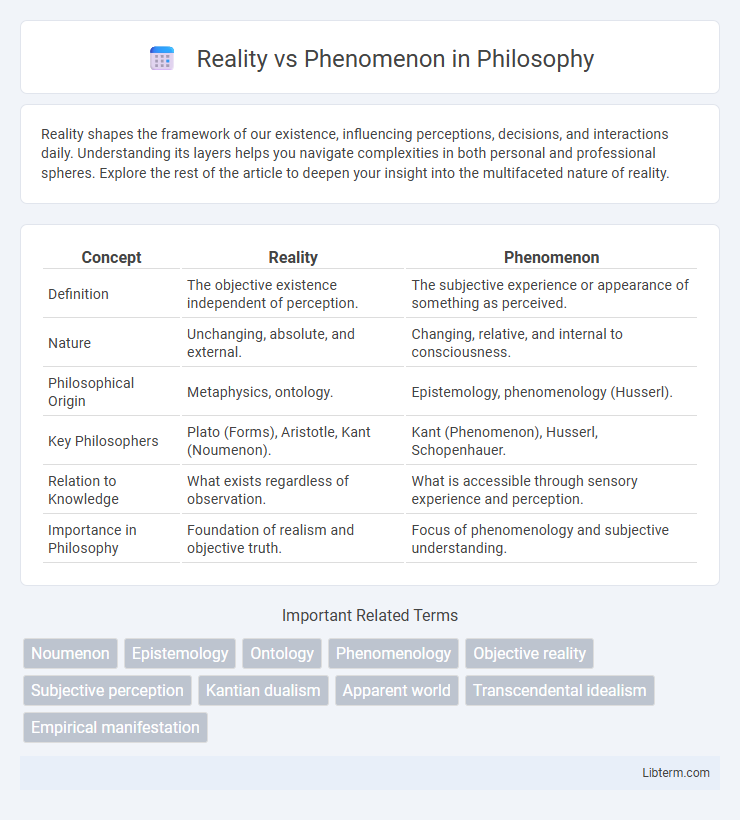Reality shapes the framework of our existence, influencing perceptions, decisions, and interactions daily. Understanding its layers helps you navigate complexities in both personal and professional spheres. Explore the rest of the article to deepen your insight into the multifaceted nature of reality.
Table of Comparison
| Concept | Reality | Phenomenon |
|---|---|---|
| Definition | The objective existence independent of perception. | The subjective experience or appearance of something as perceived. |
| Nature | Unchanging, absolute, and external. | Changing, relative, and internal to consciousness. |
| Philosophical Origin | Metaphysics, ontology. | Epistemology, phenomenology (Husserl). |
| Key Philosophers | Plato (Forms), Aristotle, Kant (Noumenon). | Kant (Phenomenon), Husserl, Schopenhauer. |
| Relation to Knowledge | What exists regardless of observation. | What is accessible through sensory experience and perception. |
| Importance in Philosophy | Foundation of realism and objective truth. | Focus of phenomenology and subjective understanding. |
Understanding Reality: Definitions and Perspectives
Understanding reality involves differentiating between objective existence and subjective experience, where reality refers to the actual state of things independent of perception. Phenomenon signifies observable events or experiences as they appear to the senses, often shaped by individual or cultural interpretation. Philosophical perspectives like realism emphasize an external reality, while phenomenology studies consciousness and the structures of experience, highlighting the interplay between reality and appearance.
The Nature of Phenomena: Beyond Perception
Phenomena represent the observable expressions of reality as they appear to human senses, shaped by cognitive and sensory filters. The nature of phenomena extends beyond mere perception, encompassing both subjective experience and the underlying conditions that generate observable events. Understanding phenomena requires analyzing not just sensory data but also the conceptual frameworks and environmental contexts influencing perception and interpretation.
Reality vs Phenomenon: Core Differences
Reality represents the objective existence of things independent of observation, while phenomena are the subjective experiences or perceptions of those realities. Core differences lie in reality's unchanging nature versus phenomena's variability influenced by sensory and cognitive interpretations. Understanding these distinctions clarifies how humans interpret the external world through filtered sensory input rather than direct access to reality itself.
Philosophical Roots: Realism and Phenomenalism
The philosophical roots of Reality vs Phenomenon are deeply anchored in Realism and Phenomenalism, where Realism asserts that objects exist independently of perception, emphasizing an objective reality. Phenomenalism, by contrast, argues that physical objects only exist as sensory phenomena or perceptual experiences, making perception central to understanding reality. This dichotomy challenges the nature of existence, questioning whether reality is a mind-independent entity or constructed through human experience.
How Our Senses Shape Phenomena
Human senses act as filters, translating external reality into phenomena perceived by the brain, shaping subjective experiences. Sensory receptors detect stimuli such as light, sound, and tactile pressure, converting them into neural signals that the brain interprets as distinct phenomena. Limitations and biases in sensory processing often result in a divergence between objective reality and individual perception, highlighting how perception constructs subjective realities.
Scientific Approaches to Reality and Phenomena
Scientific approaches to reality emphasize objective measurement and empirical evidence, treating reality as the external world accessible through observations and experiments. Phenomena are considered sensory experiences or events as they appear to observers, often requiring interpretation through theoretical frameworks. This distinction allows science to bridge observable phenomena with underlying realities by employing models, hypotheses, and reproducible data to validate findings.
The Influence of Culture on Perceived Phenomena
Cultural frameworks shape the interpretation of phenomena, influencing how reality is perceived and understood across different societies. Symbol systems, language, and shared beliefs mold sensory experiences into culturally specific realities, creating diverse cognitive patterns. These cultural lenses filter phenomena, highlighting the subjective nature of reality and challenging the idea of an absolute, universal experience.
Reality in the Age of Technology and Media
Reality in the age of technology and media is increasingly shaped by digital simulations and augmented experiences that blur the line between what is real and what is constructed. Advanced algorithms curate personalized content, influencing perceptions and creating echo chambers that challenge objective truths. As virtual environments and artificial intelligence become integral to daily life, distinguishing authentic reality from mediated phenomena requires critical media literacy and awareness of technological biases.
Common Misconceptions: Phenomenon Mistaken for Reality
Phenomena are often mistaken for reality due to their direct sensory appearance, leading to the misconception that what is observed is the complete truth rather than a subjective or limited interpretation. This confusion arises because phenomena represent how things appear under specific conditions, whereas reality encompasses the underlying nature that may be hidden or more complex. Misunderstanding this distinction can cause flawed beliefs and hinder deeper comprehension in fields ranging from science to philosophy.
Toward Objectivity: Navigating Reality and Phenomenon
Navigating the boundary between reality and phenomenon requires a keen focus on objectivity, emphasizing observable facts over subjective experience. Reality consists of objective entities and events independent of perception, while phenomena represent the interpreted experiences perceived by consciousness. Employing scientific methods and critical thinking aids in distinguishing external reality from internal phenomena, fostering a clearer understanding of truth.
Reality Infographic

 libterm.com
libterm.com